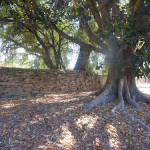We run our website the way we wished the whole internet worked: we provide high quality original content with no ads. We are funded solely by your direct support. Please consider supporting this project.

Why Did Jesus Curse a Barren Fig Tree?
While no one argues that the NT advocates violence explicitly, many allege that some passages reflect violent attitudes toward outsiders, and especially toward non-believing Jews, while others detect an element of violence in some of Jesus’ teachings and behavior. Some scholars argue that this violent aspect of the NT laid the groundwork for later Christian violence when the church began to embrace the power of the state in the fourth century. I am dealing with a few episodes from the life of Jesus that have often been used to argue for violent acts. Today I want to look at the cursing of the barren fig tree.
Both Matthew and Mark recount an episode in which Jesus cursed a fig tree because it bore no fruit and Jesus was hungry (Mt 21: 18-22, Mk 11:12-3, 21-5). What makes Jesus’ only destructive miracle even more puzzling is that Mark informs us that, “it was not the season for figs” (v. 13). According to some, this story represents Jesus engaging in a violent attack on the tree that make him appear cruel. One writer goes so far as to speculate that Jesus must have violently cursed this tree “in a petty fit of low blood sugar or something like that.”[1] I submit that if we read these accounts in context and with any degree of charity, it becomes clear that Jesus did not curse this tree in a fit of childish, cruel, or petty anger.
Fig trees are frequently used to symbolize either spiritual fruitfulness or unfruitfulness in the OT (Isa 28:4; Jer 8:13; 24:1-10; 29:17; Hos 2:12; 9:10,16-7; Mic 7:1). In this light, Jesus’ cursing of the barren fig tree should be understood as a symbolic judgment on the nation of Israel. This is made all the more clear from the fact that Mark interjects Jesus’ cleansing of the Temple (See post), which was itself a symbolic judgment on the corrupt leaders of Israel, between Jesus’ curse of the fig tree and the time when the disciple’s notice that the tree had withered. Moreover, in both Gospels the cursing is followed by a confrontation between Jesus and Jewish authorities that concludes with Jesus telling two parables that indict these leaders (Mt 21:13-46; Mk 11:27-33; 12:-1-12). By cursing the tree, Jesus is acting out a parable as God’s spokesperson against Israel.
On top of this, I submit that there is another dimension to the symbolic destructive action of Jesus in this episode. The NT reflects the widespread Jewish apocalyptic expectation that the coming of the Messiah at the end of the age would remove the curse on creation and restore it to what God originally intended it to be (e.g. Acts 3:21; Rom 8:19-22; Col 1:18-20; 2 Pet 3:13). Moreover, in apocalyptic thought, barren or infected fruit trees were sometimes understood to reflect the corrupting influence of fallen angelic powers, and barren fig trees in particular had in some writings become symbols of this curse. In this light it is easy to interpret Jesus’ cursing of the barren fig tree as not only a symbolic pronouncement of judgment on Israel, but also as a symbolic judgment on Satan’s curse on the earth. And in cursing the curse, as it were, Jesus was once again presenting himself as the Messiah who had come to vanquish Satan (Heb 2:14; 1 Jn 3:8) and to restore God’s good creation.
[1] J. H. Ellens, ed., The Destructive Power of Religion: Violence in Judaism, Christianity, and Islam, Volume 3 (Westport, CT: Praeger, 2004), 16.
Photo credit: Jackal1 via Visual Hunt / CC BY-ND
Category: General
Tags: Jesus, Non-Violence
Topics: Enemy-Loving Non-Violence
Related Reading

The Politics of Jesus
Many are so conditioned by the mindset of the world that they can’t even envision an alternative way of affecting society and politics other than by playing the political game as it is done by the established governmental system. Some thus conclude that, since Jesus didn’t try to overhaul the political systems of his day…

Jesus Repudiates OT Commands on Oath-Taking: A Response to Paul Copan (#9)
In his critique of Crucifixion of the Warrior God (CWG), Paul Copan argues that “Boyd pushes too hard to make Jesus’ teaching appear more revolutionary than it really is” [italics original]. Whereas I argue that Jesus repudiates aspects of the Old Testament (OT), Copan argues that Jesus merely repudiates wrong applications of the OT, not…

Why Did Jesus Curse the Fig Tree?
One of the strangest episodes recorded in the Gospels is Jesus cursing a fig tree because he was hungry and it didn’t have any figs (Mk 11:12-14; Mt 21:18-19). It’s the only destructive miracle found in the New Testament. What’s particularly puzzling is that Mark tells us the reason the fig tree had no figs…

The Kingdom, Just War Theory, and Ukraine
History textbooks often read like surveys of how countries handled war with other nations. The stuff between the conflicts reads like precursors and aftermath to the history-making actions of war. Now we observe the rising tension between Russia and Ukraine along with other world leaders as they try to determine how to respond. Sadly, church history…

The Jesus Story is a Myth!…And History
Image by Len dela Cruz The Jesus story has a curious, and fascinating, relationship with myth and legend. The story of God coming to earth, being born of a virgin, manifesting a heroic, counter-cultural love toward outcasts, dying for the people who crucified him and then rising from the dead has a familiar “echo” to it.…

Was Jesus Abandoned by the Father on the Cross?
As Jesus hung on the cross, he cried, “Eli, Eli, lema sabachthani?” (Mt 27:46). This is the cry of our God who stooped to the furthest possible depths to experience his own antithesis, as the all-holy God becomes the sin of the world (2 Cor 5:21) and the perfectly united God becomes the curse of…
